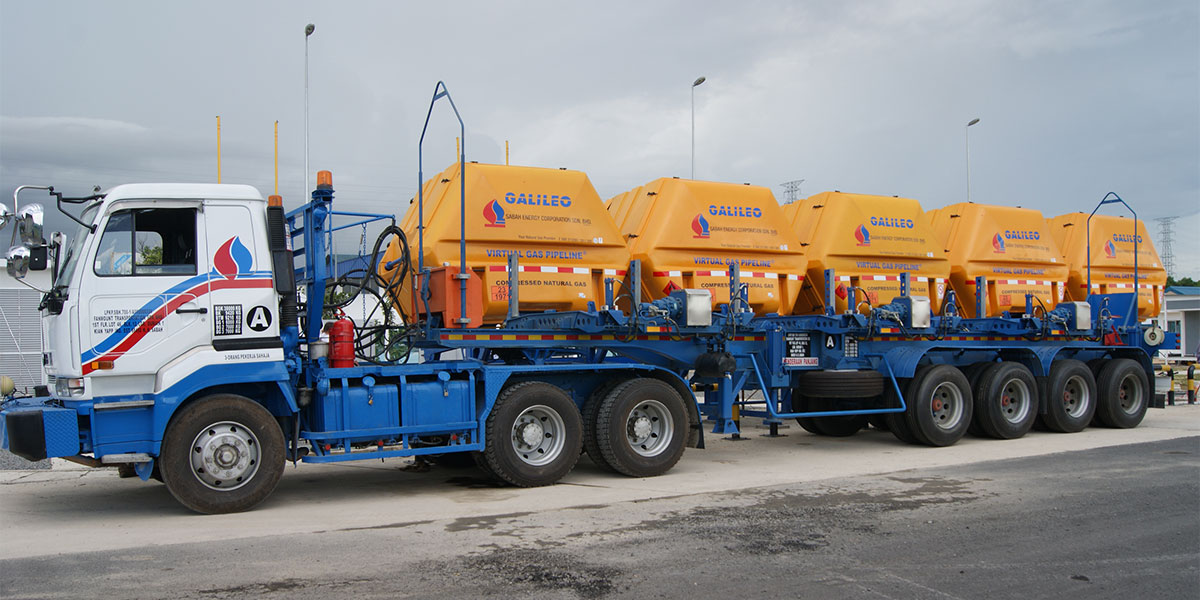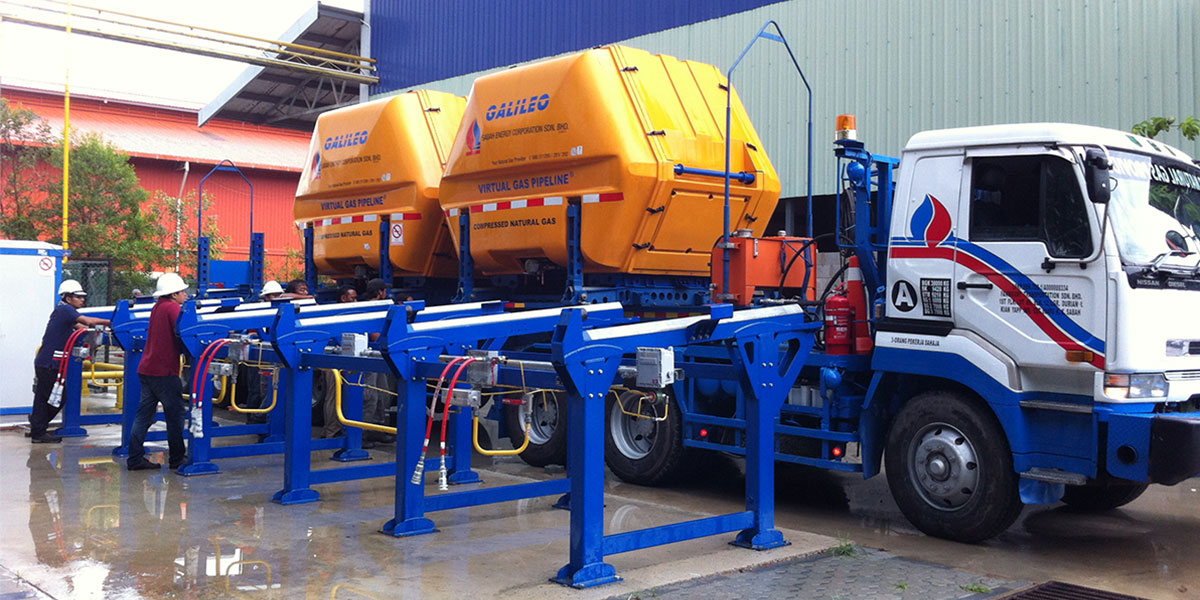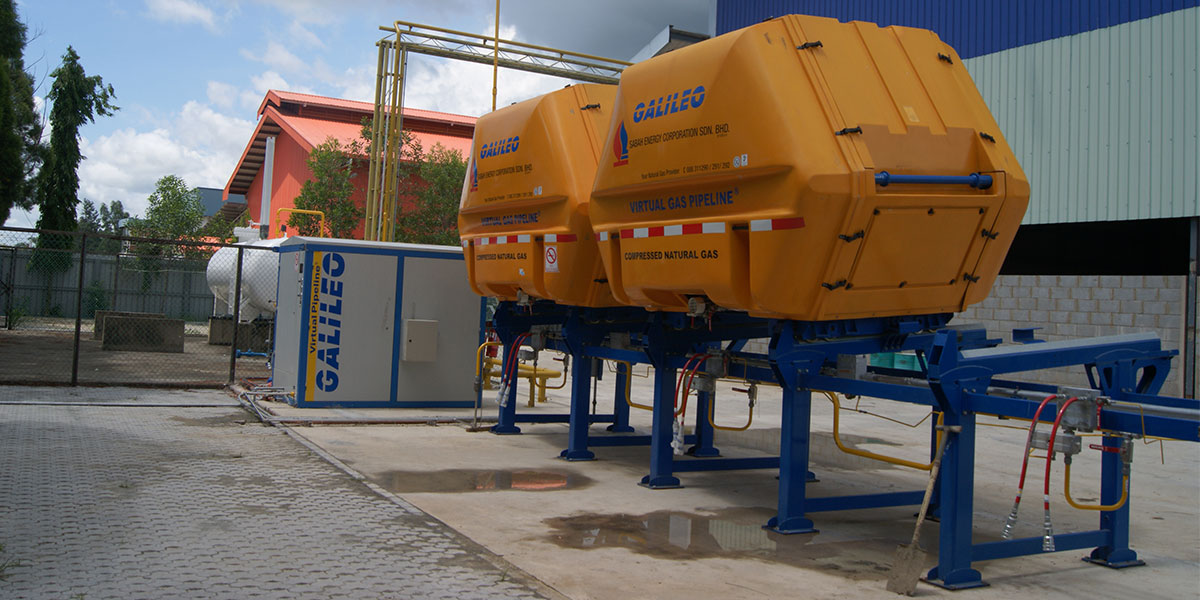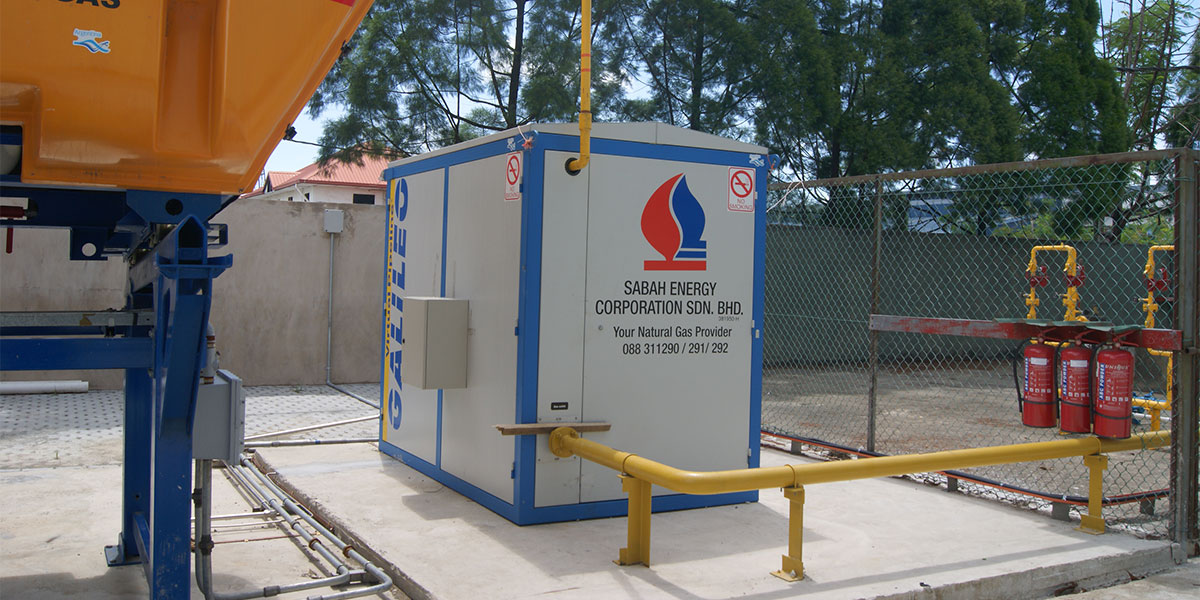In Borneo, Galileo brings gas beyond pipelines
Sabah Energy Corporation (SEC) has adopted Galileo’s Virtual Pipeline™ to supply natural gas to industries widely spread all over Sabah. In this way, SEC is positively contributing to efforts that reduce carbon footprint and enhance economic growth.
In the Sabah State of East Malaysia, on the northwest coast of Borneo, Galileo’s Virtual Pipeline™ technology allows for the compression of natural gas and its distribution by road at the pressure required by consumers.
While the high costs of laying underground pipelines prevented SEC from distributing natural gas within the inlands of Sabah, the Virtual Pipeline™ enables cost-effective distribution within a 70 km (43 miles) radius from Kota Kinabalu Industrial Park (KKIP).

Galileo’s Micobox CNG Compressors working as Mother Station for the SEC Virtual Pipeline.
“Distributing natural gas via the Virtual Pipeline™ System is in line with the goal of the Sabah State to make this resource available to a wider spectrum of users. Being comparatively much greener and yet a competitively priced fuel, natural gas will undoubtedly boost the growth of industries in the State,” said Yb Datuk Dr. Yee Moh Chai, Deputy Chief Minister Cum Minister of Resource Development and IT of Sabah.
“Apart from savings in fuel costs, industrial users will also achieve other savings due to lower costs in maintenance, handling and storage, manpower, and pollution control, among other advantages,” added Dato Harun HJ Ismail, CEO of SEC.
"Being comparatively much greener and yet a competitively priced fuel, natural gas will undoubtedly boost the growth of industries in the State"
- Yb Datuk Dr. Yee Moh Chai, Deputy Chief Minister Cum Minister of Resource Development and IT of Sabah.
Customized Natural Gas distribution, with no pipes
Sabah’s Virtual Pipeline™ operation starts at the KKIP with a CNG compression process that can reach a pressure of up to 250 bar (3,625 psi) on account of Microbox™ packaged compressors, which work as mother stations. Then, CNG is distributed in modular containers (MAT™) transported by road on specifically designed trailers (VST™) to the daughter stations installed at the customers’ facilities.
Upon their arrival at the consumption point, the easy-to-operate VST trailers’ mechanism unloads, as scheduled, the filled MAT modules, then loads the empty ones and the truck continues its route to the next daughter station.
As part of the system’s adaptation to the existing demand, all MATs are connected to Pressure Regulating Plants (PRP™), which supply natural gas at a suitable outlet pressure and flow, as requested by final users.
Unlike the traditional tube trailer, MATs can be exchanged even if the gas has not yet petered out, thus, avoiding transport waiting times. When the gauge is low, daughter stations automatically order supply, ensuring seamless fuel supply. Once the truck has exchanged the empty modules for the full ones, it goes back to the mother station to restart the cycle, which is monitored 24/7 via internet through Galileo’s SCADA System. This ensures permanent and suitable gas supply in accordance with the consumption demand.
CNG: clean fuel to boost the economic grow
Working with modules guarantees scalability for optimal sizing. As the system increases its capacity at the pace of demand, it is possible to strike a perfect balance between operating and investment costs. This feature turns the Virtual Pipeline™ into the most suitable solution for gas supply in Sabah, one of the fastest growing industrial regions in Malaysia.
As the consumption of natural gas decreases carbon footprint, the Virtual Pipeline™ has become part of the Malaysian government’s green policy followed to align economic development with environmental protection. In fact, ecotourism is one the main economic drivers of the state as Kota Kinabalu is a popular gateway for travelers visiting rainforest areas in Sabah and Borneo.
“As compared to any traditional fuel source, natural gas is always a much cheaper and cleaner fuel. This translates directly into cheaper operating cost, hence better bottom line. At the same time, mother earth will be thankful for the use of natural gas,” said the Resource Development and Information Technology Minister, Datuk Siringan Gubat, during the Commissioning ceremony of the daughter station installed at Colourcoil Industries Sdn Bhd in Telipok, on August 23rd, 2013.
“We will also be able to preserve our pristine environment and maintain our position as chosen by eco-tourism,” he concluded.
“As compared to any traditional fuel source, natural gas is always a much cheaper and cleaner fuel. This translates directly into cheaper operating cost, hence better bottom line. At the same time, mother earth will be thankful for the use of natural gas”.
- Datuk Siringan Gubat – Resource Development and Information Technology Minister.
[Fisherman on Suhen River. Photo: Dave Forney.]
Since the system was officially launched by the Chief Minister, Datuk Seri Musa Hj Aman, in July 2012, and the Virtual Pipeline’s mother station came into service on June 10th, 2013, three industrial companies have joined this initiative: Tomher Industrial Sdn Bhd, manufacturer of high density polyethylene-based products such as pipes and tanks for the distribution and storage of water; Colourcoil Industries Sdn Bhd, manufacturer of prepainted steel coils; and Cargill Desa Sdn Bhd, producer of animal feed and ingredients.
The system’s implementation, which complies with accepted international standards such as ISO 9001 and ISO 15500, is well ahead its original schedule, as planned in the blueprint. The commissioning at Desa Cargill Sdn Bhd, for example, was achieved six months before the original date programmed for March 2014, yielding anticipated energy savings to this company. This achievement has raised considerable interest; in fact, four companies have already signed up to be connected to the system in the coming months.
Among many other undertakings, the Virtual Pipeline™ has benefited remote communities and mining projects in Argentina, industrial facilities in Indonesia and South Africa, as well as tourism resorts in the Dominican Republic and Bulgaria.



